This fermented pepperoncini hot sauce is an easy and delicious summer fermented food recipe. It’s perfect for preserving the summer harvest, packed with tons of flavor, and not quite as spicy as traditional hot sauce.
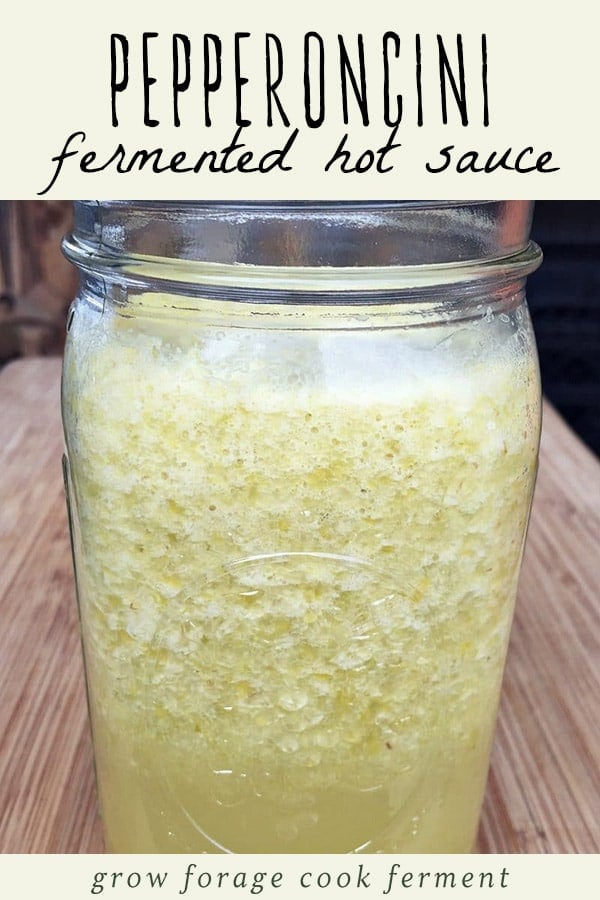
Want to save this post for later?
Pepperoncini Peppers for Hot Sauce
For some reason this year, most of our pepper plants didn’t do very well. We only got one or two bell peppers total, and a few hot peppers here and there.
Then we have this one pepperoncini plant which has produced so many peppers that I don’t even know what to do with all of them!
I turned a bunch of them into pepperoncini refrigerator pickles to put on sandwiches and pizza. You could also pickle peppers and make pepper jelly, if you have a surplus of peppers on your hands.
The plant then had a second flush of peppers, so I decided to ferment them this time around. Then I got the great idea of turning them into fermented pepperoncini hot sauce!
Pepperoncini’s are such great peppers because they are a little bit spicy, but not overly so. They also have an excellent flavor that is more than just “hot.”
I absolutely love fermented hot sauce and generally make it a couple of times a year to make sure that we always have some around.
I usually make it with hot red peppers, or sometimes jalapeno peppers, but when we had an excess of pepperoncini peppers I knew I had to give it a try with them.
Fermented Pepperoncini Hot Sauce Recipe
It’s actually a pretty simple process, and I basically followed my general recipe for how to make fermented hot sauce.
Cut the pepperoncini peppers in half (you can leave the stems on), and layer them in a quart sized jar with the chopped onion and garlic cloves.
You can remove some of the pepper seeds if you’d like it to be a little less hot.
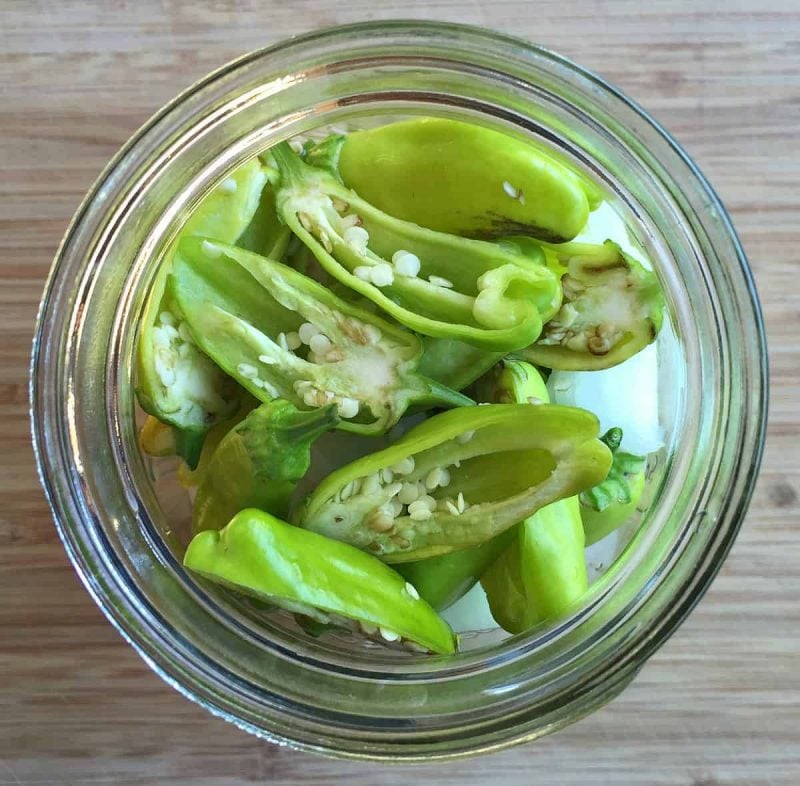
Add the salt to the jar, and fill with filtered water to cover the veggies. Cover and shake the jar a few times to help dissolve the salt.
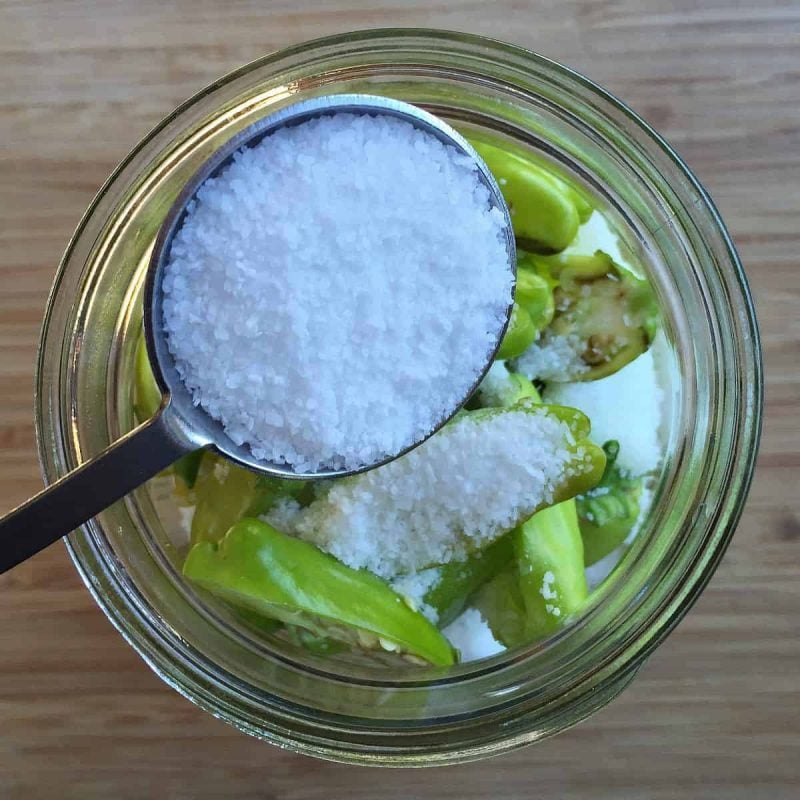
Weigh the veggies down with a fermentation weight to keep them under the brine (you can also use a zip top baggie filled with water as a weight).

Cover the jar with a cloth secured with a rubber band, and let it ferment in a dark corner for 1-2 weeks.
When the veggies are done fermenting, put the contents of the jar and the apple cider vinegar into a blender. You may not want to use all of the brine, depending on how thick you want the hot sauce to be.
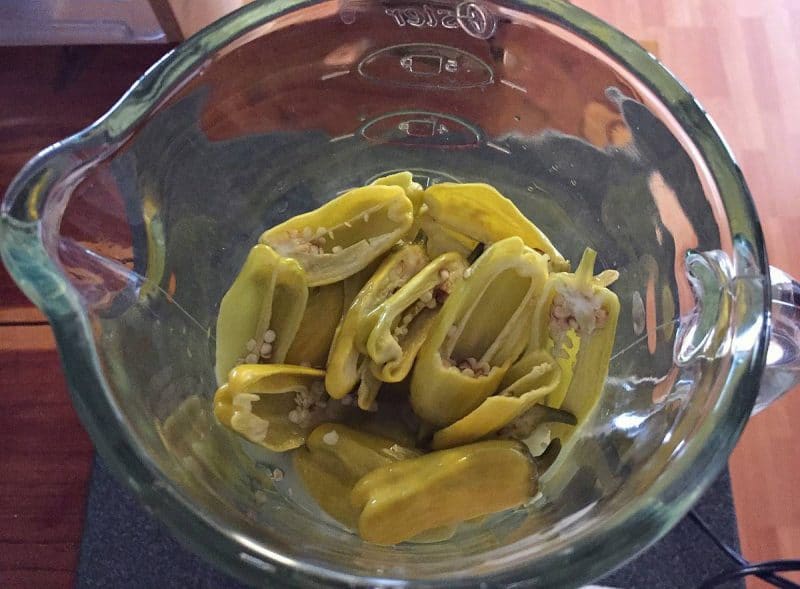
Blend into hot sauce, and store in the refrigerator.
If you use all of the brine it will be fairly liquidy. I am ok with that, because then it can readily go into a squeeze bottle that is easy to use.
If you’d like a thicker hot sauce, or even something more like fermented chili paste, use less of the brine when you blend.
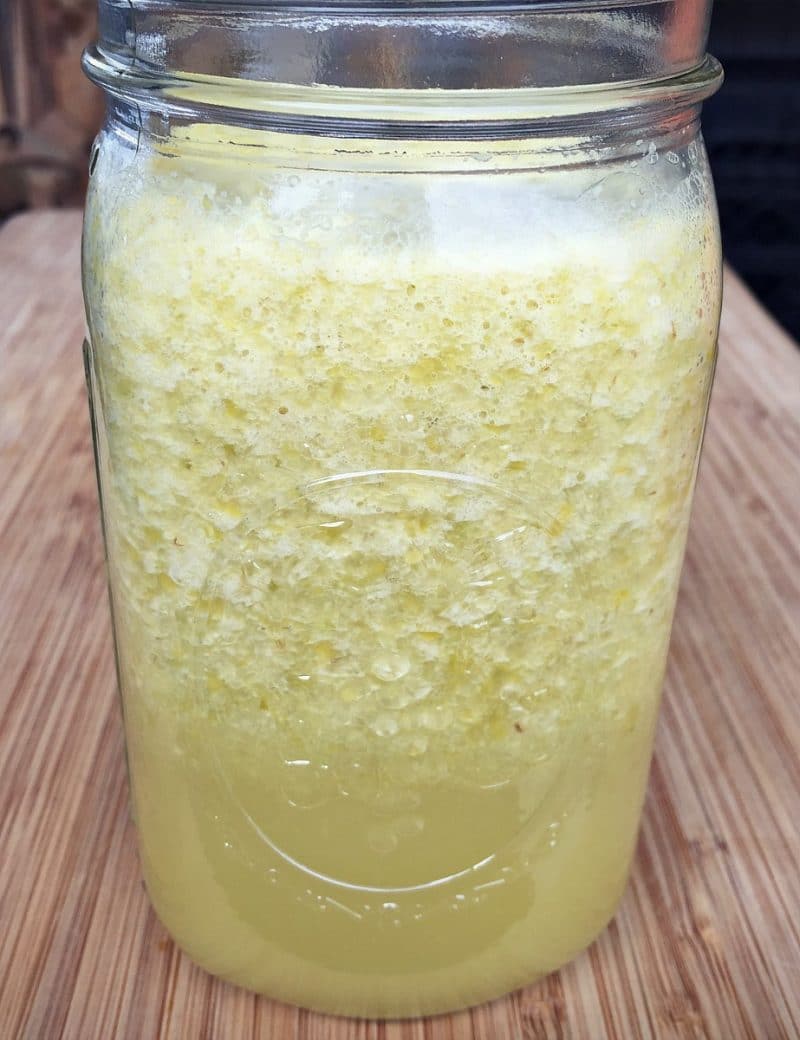
These peppers smelled so good after fermenting! They would be really good just on their own as well, even if you didn’t want to turn them into hot sauce.
They lost a bit of their green color during the fermentation process, which is normal.
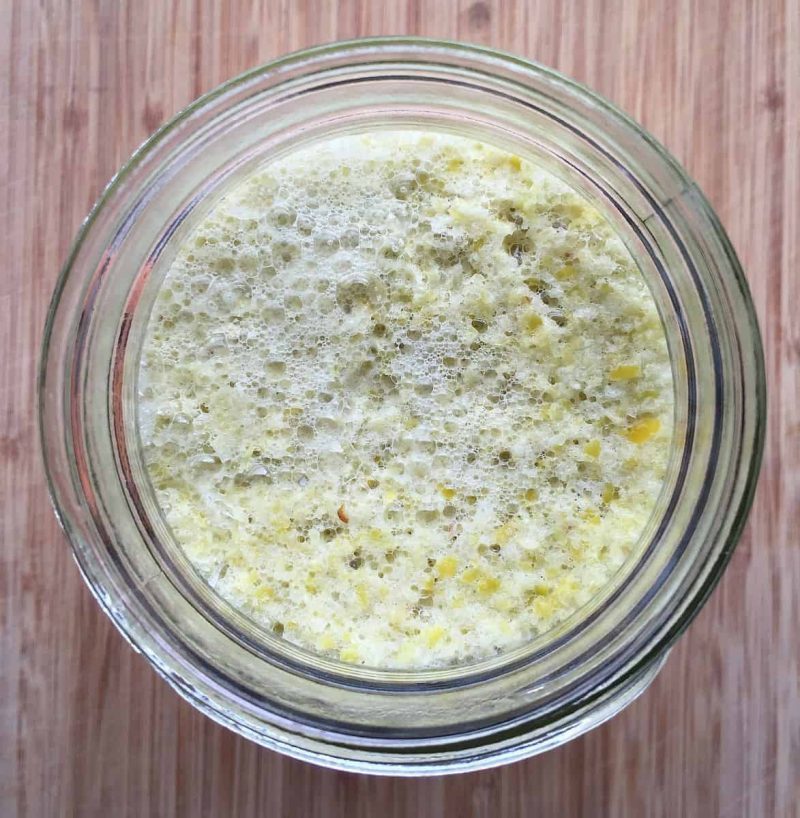
I am so happy with how this fermented pepperoncini hot sauce turned out, the taste is incredible! It has just enough heat to be classified as a hot sauce, but is not so hot so many people can still enjoy it.
It’s definitely going to become a new staple in this household!
Have you ever made fermented hot sauce? What did you think of it?
Fermented Hot Sauce Recipes
Love a good fermented sauce recipe as much as I do? Here are a few others for you to try!
Fermented Pepperoncini Hot Sauce Recipe
Ingredients
- 1 quart pepperoncini peppers
- 1 small onion sliced
- 4-6 cloves garlic
- 2 Tbsp kosher, pickling, or sea salt kosher or sea salt works best
- 1 Tbsp raw apple cider vinegar
Instructions
- Slice the pepperoncinis in half. Remove some of the seeds to adjust the heat to taste. Layer the halved peppers, onions, and garlic into a quart sized jar, alternating the vegetables as your fill the jar.
- Add the salt to the jar, then fill with filtered water to cover the vegetables. Cover and shake the jar a few times to help dissolve the salt.
- Place a fermentation weight over the vegetables to keep them under the brine. Cover the jar with a cloth secured with a rubberband.
- Place the jar into a dark corner and ferment for 1-2 weeks.
- When the vegetables are done fermenting, place the contents of the jar as well as the apple cider vinegar into a blender. Blender until the vegetables are pulverized. For a thicker sauce, reserve half the brine before blending, adding more to reach your desired texture/thickness.
- Store the sauce in a lidded jar in the refrigerator.
Notes
- Total Time does not reflect 1-2 weeks fermentation
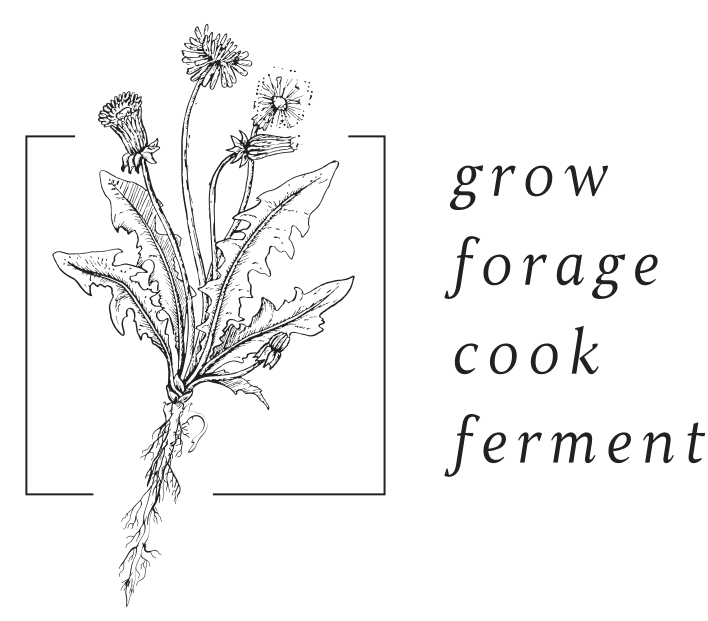
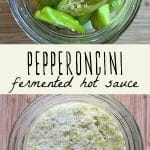
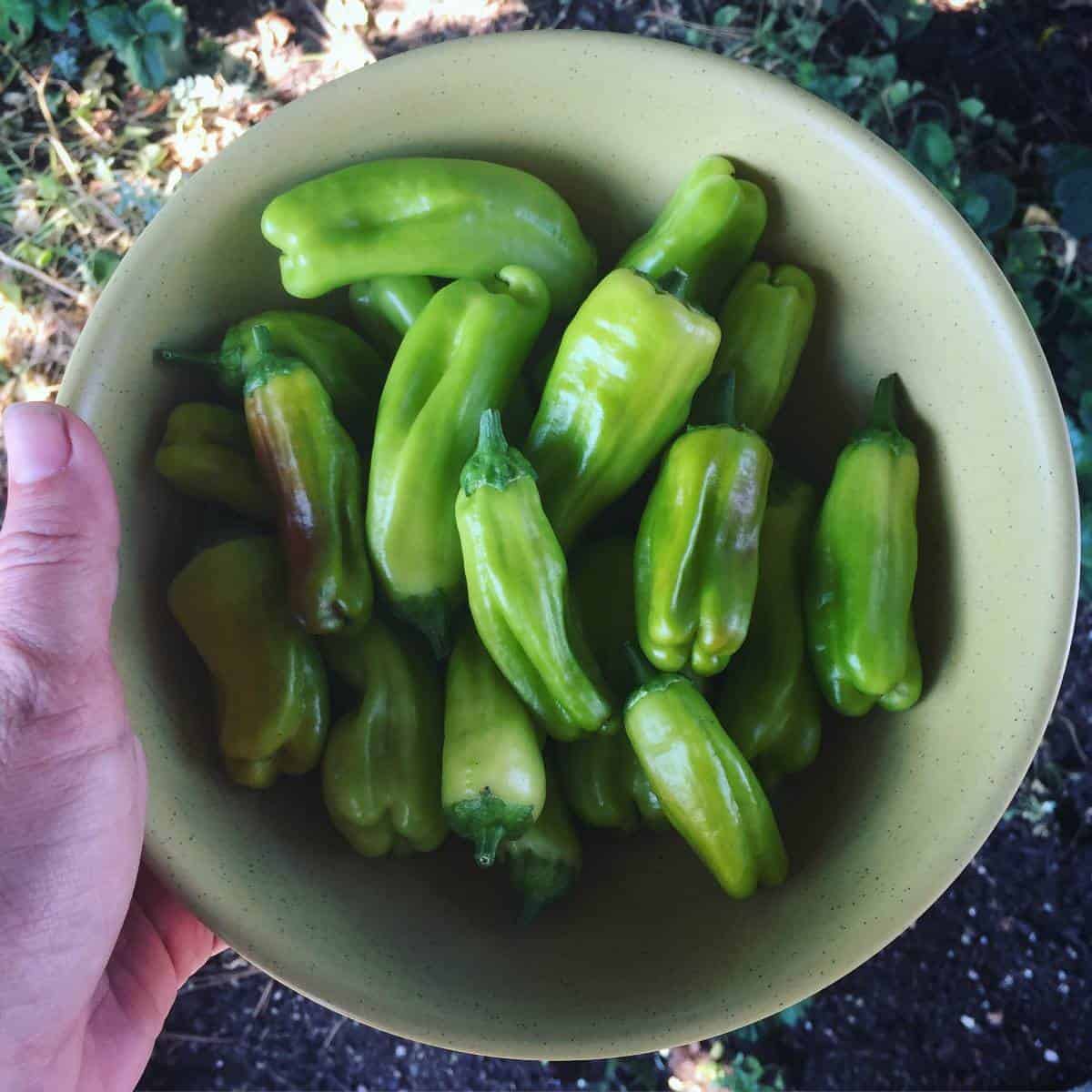
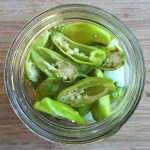

I did everything you said – after 2 weeks I blended it w/the ACV and it was extremely too salty, so I saute’d more pepperonchini’s and 1 more onion to add and it’s still to salty. what can I do? I would hate to toss the whole thing but it’s unedible at this point.
You could try adding a little sweetness to balance out the saltiness.
How long will this last in the fridge after opening/using
A long time, several months, if not longer. Fermentation naturally preserves it.
Dangit! I added the apple cider vinegar and then re-read the instructions. What do you think will happen? Did I ruin it right out of the gate?
Hi Susie. It should still ferment.
This is a wonderful idea, dear Colleen. Thank God you shared this recipe with us.
Thank you!
I gave this a try, and after one week have noticed mould form on the top. What am I doing wrong? Followed everything accordingly, except I didn’t have non-iodized salt so used regular salt. Is that the issue??
Hi, Mary. Iodine can prevent good bacteria from growing in vegetable ferments, so that may be what caused your mold.
How long does the sauce last in the refrigerator once made?
I have lots of different peppers so this sounds like a fun thing to do. After you ferment, do you have to refrigerate the sauce or not?
Yes, you will need to refrigerate it once it’s finished.
Love pepperoncini peppers and this method of preserving. Sadly, I didn’t consider hot sauce when I needed to do something with my banana peppers. Argh, lol.
Maybe next year.